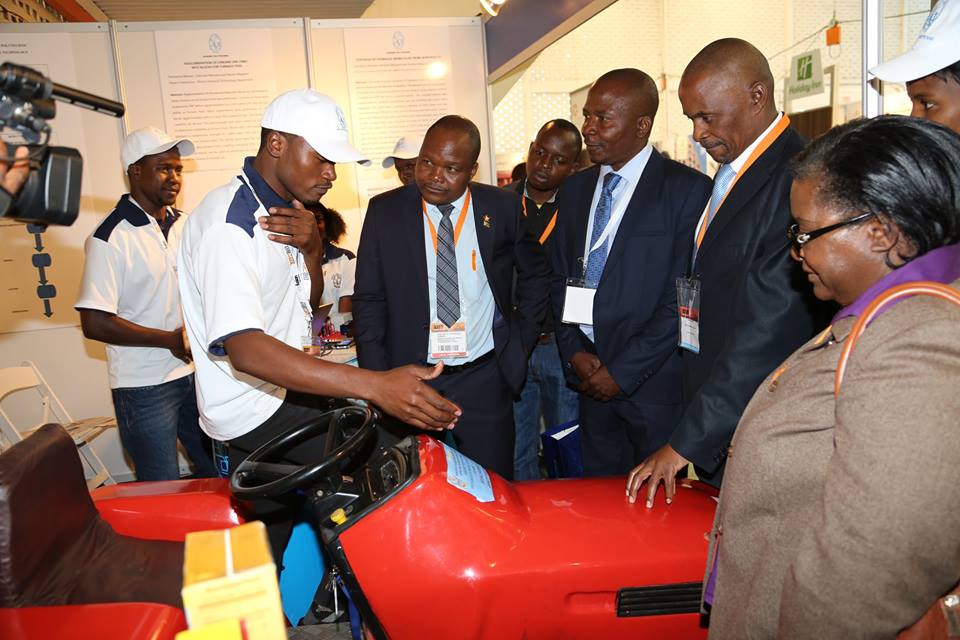By Tinashe Gwarazimba and Tinotenda Mapfumo
Harare Polytechnic students have been urged to be innovative by coming up with innovative ideas that bring about technological improvements.
This is because for a country that largely relies on imports for most of its products, any homegrown solution to homegrown problems is a welcome development.
Most industries are struggling to reach capacity utilisation and the local market relies on imports for services provided by the motor vehicle and food industries as well as the clothing sector.
The development calls for innovative ideas on how to solve local problems using readily available resources.
It is this realisation that moved a Harare Polytechnic student, Blessing Mutwira to design a multi-purpose riding lawn-mower, which was exhibited at the 58th edition of the Zimbabwe International Trade Fair (ZITF) that ran under the theme: “Creating linkages for industrial development.”
The mower which has a 14HP engine and can be used for cutting grass as well as for farming purposes is an example of innovations that can help the country cut on costs of importing equipment.
Most lawn mowers that are used in Zimbabwe are imported from other countries, use many blades to cut the grass, which means more fuel consumption, and are sold at exorbitant prices.
Deputy Minister of Higher and Tertiary Education, Science and Technology, Godfrey Gandawa who visited the Harare Polytechnic stand during the Trade Fair commended the institution for coming up with the product.
“I am impressed by the Harare Polytechnic’s riding lawn mower. The project is practical and already has a market therefore its profitability to the country’s economy is guaranteed.
Dr Gandawa said the project is in sync with the country’s drive towards industrialisation and government policy on finding home grown solutions.
“It is a practical project, which is already working and already has a market therefore pushes forward the industrialization strategy that the economy is moving toward.”
Mutwira’s mower was manufactured using the process of reverse engineering.
Locally available resources such as fiber, aluminum and mild steel were used in manufacturing the mower, which speaks well to the government’s policy on import substitution.
Currently, such machines are imported and expensive both to purchase and maintain.
“My aim was to come up with a riding mower that is more durable, safer, cheaper and easier to maintain than other riding mowers that are imported,” said Mutwira.
The imported machines are prone to short-circuiting and to counter this problem, Mutwira included in his model a fuse box, which blows off in the event of a short circuit.
The mower also, has safety features such as brakes, indicator lights and hazards for use in public places. The machine is efficient as it covers about 1, 2 m cutting distance as compared to other mowers that only cover about 50 cm.
The project supervisor and lecturer in the department of Mechanical Engineering at Harare Polytechnic said: “The student has passion for automobiles which made us challenge him to come up with a lawn mower for our institution. However, the product can be used in making hay balls in the Agriculture sector.”
Such an initiative is a step towards improving the country’s industry in order to cut down the costs incurred in importing products from other countries.
This is an example that the country has got what it takes in terms of innovative personnel that can help in the transformation of the economy from its current extractive state to an industrialized and knowledge-based economy.
The project resonates well with the Science, Technology, Engineering and Mathematics (STEM) policy, which was spearheaded by the Ministry of Higher and Tertiary Education, Science and Technology Development.
STEM is a government policy introduced in 2015 with the sole purpose of producing graduates with scientific skills to drive the country’s transformative agenda towards an industrialized and knowledge-based economy.






